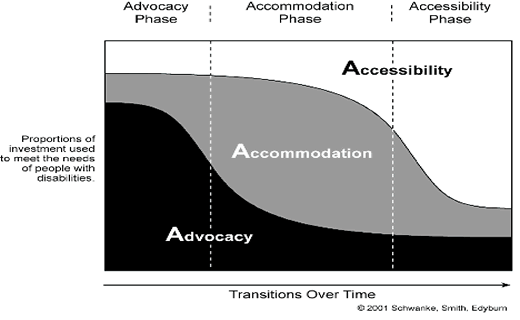Featured Entries
Know a good UDE website or resource?
The Conceptual Framework of ACCESS-ed
Conceptual Framework: ACCESS-ed on UDE
The A3 diagram, below, demonstrates the three phases of the A3 model that guide the ACCESS-ed approach to universal design in education: advocacy, accommodation, and accessibility. The three phases occur on a continuum and represent a developmental progression in meeting the needs of students and staff with disabilities within the model advancing toward full universal design and accessibility.
The advocacy phase represents the majority of the model early on and occurs when an awareness is raised due to a particular event. The accommodation phase represents the majority of contemporary approaches to intervention to make campuses available to individuals with disabilities. Change occurs in order to meet the specific needs of one individual. The accessibility phase represents the majority of the model in the later stages, representing change over time. Ideally it occurs when change is designed to meet the needs of all individuals.

REFERENCES
Edyburn, D. L. (2001). Models, theories and frameworks: contributions to understanding special education technology. Special Education Technology Practice, 4 (2), 16-24
Schwanke, T.D., Smith, R. O, & Edyburn, D.L. (2001). A3 model diagram developed as accessibility and universal design instructional tool. Proceedings of the RESNA 2001 Annual Conference, 205-207.
Smith, R.O., Edyburn, D., & Silverman, M.K. (1999). Using the AAA model for performing accessibility audits. Proceedings of the RESNA 1999 Annual Conference, 163-165.
No author (2006). The A3 model (Advocacy, Accommodation, and Accessibility). In, ATOMS Project: Models and Taxonomies Relating to Assistive Technology Resource [sic]. Retrieved from http://www.r2d2.uwm.edu/atoms/archive/technicalreports/fieldscans/fs7/tr-fs-taxonomiesmodels-resource.html#b36







